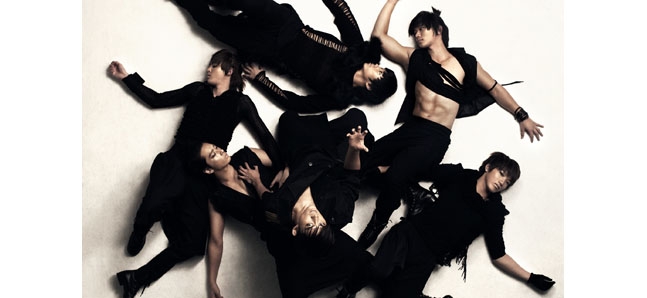
2PM
Posted: Thu Nov 11 2010
The immensely popular boy band TVXQ (known as Tohoshinki in Japan) have broken up and JYJ – a group made up of TVXQ’s Junsu, Jejung and Yuchun – have suspended their activities here because of problems surrounding their management company. So the battle for dominance among the Korean boy bands is heating up.
If you had to choose one group, perhaps Big Bang are now closest to being in the position that TVXQ used to occupy, but there are plenty of other young groups ready to pounce on the top spot, like Super Junior, SS501, Shinee, F.T. Island, Choshinsei (Choshinsung in Korean) and CN Blue. Not only that, but there is also the next generation of new groups, who are about to put out their debut releases in Japan – groups like the nine-member ZE:A, 2PM and Beast.
There’s a seemingly endless array of these Korean boy groups. For someone who isn’t a particular fan of Korean pop, it’s probably difficult to make heads or tails of them all, but each group has its own particular style, and the more you learn about them the more you realise how diverse the world of Korean boy bands is.
Recently the popularity of Korean girl groups like Shojo Jidai (aka Girls’ Generation) and Kara has exploded, but it’s the remarkably unceasing activities of the boy bands that laid the groundwork for their success in Japan. If you ask the fans of the girl groups, many came to groups like Girls’ Generation and Kara through first being fans of the Korean boy bands. It’s not that Korean girl groups have appeared on the scene out of nowhere, but rather, that the market for Korean pop had been carefully fomented over the years by their male counterparts.
Coupled with the influx of the powerful teenage female demographic into their fanbase, the still current, sustained interest in Korean pop idols is really just an inevitable development. For those who are listening to Girl’s Generation or Kara simply because they seem fresh and new, or because on-trend, it’s definitely worth giving the amazing work done by the boy bands a look too, as they are the ones who laid the foundations for the current success of Korean pop in Japan.
The moment the phrase ‘Japanese debut’ is used here, there is a comforting sense that a band has been given a seal of approval or that a certain amount of fanfare accompanies them. It’s not really aimed at Korean pop’s core fanbase, but at luring the more conservative demographic, or the casual buyer, into purchasing the music. Take, for instance, groups like ZE:A, Beast or 2PM. In their home country they have only released a small number of singles and mini albums, and are yet to release a full first album. Consequentially, their debut albums in Japan are actually a compilation of songs previously released in Korea, which come with a sprinkling of Japan-only extras like DVDs, promotional goods or free tickets to the group’s promotional events in Japan. Despite this, these ‘debut’ releases sell phenomenally well, and have record numbers of pre-release advance orders. The sense of security, and of the ‘seal of approval,’ that the orchestrated ‘Japanese debut’ bestows upon each group allows us to see a rapid change in consumer behaviour: it stimulates demand from the conservative buyers, who would never buy the Korean import, and also from the casual buyers who have an interest in Korean pop, but would also not go so far as to buy the foreign version.
Of course, there are the hardcore fans who buy the imported versions as they come out, but in terms of units sold, the numbers don’t compare to the sales attributed to the conservative and casual demographics. At one particular store, even when the imported CDs sold well, the number sold stopped at double figures, but the ‘Japanese debut’ editions shot up to three figures, and in some cases the numbers of pre-orders were over four figures.
While the recent incredible popularity of Korean pop groups in Japan is very welcome, in all honesty, I myself can’t help but be a little irritated by the conservativeness of people who won’t make a purchase until a band has been given the official Japanese ‘seal of approval’. It means that people will miss out on all of the great new artists who are still unknown here. To truly enjoy the world of Korean pop, it’s also essential to take some risks. For fans with a deep interest, and who are feeling adventurous, it’s definitely worth checking out groups who haven’t released a single in Japan yet, like Infinite, Secret, Sistar, Nine Muses and Miss A. You’ll definitely find yourself even more hooked on Korea’s boy bands, which just keep getting better and better.
Tweets
- About Us |
- Work for Time Out |
- Send us info |
- Advertising |
- Mobile edition |
- Terms & Conditions |
- Privacy policy |
- Contact Us
Copyright © 2014 Time Out Tokyo











Add your comment